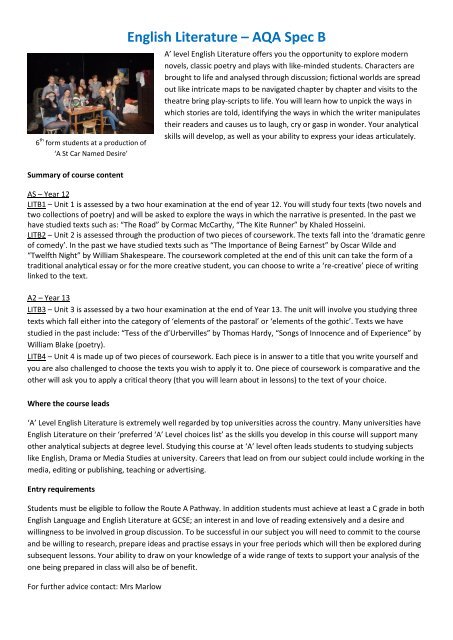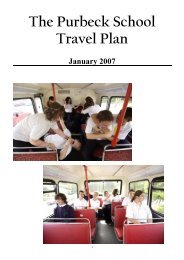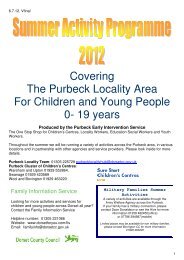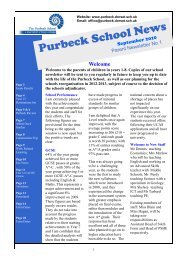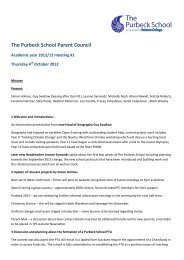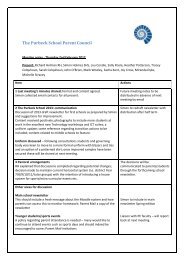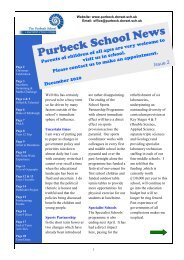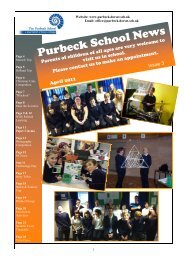Sixth Form Course Guide 2013-14 - The Purbeck School
Sixth Form Course Guide 2013-14 - The Purbeck School
Sixth Form Course Guide 2013-14 - The Purbeck School
You also want an ePaper? Increase the reach of your titles
YUMPU automatically turns print PDFs into web optimized ePapers that Google loves.
6 th form students at a production of<br />
‘A St Car Named Desire’<br />
Summary of course content<br />
English Literature – AQA Spec B<br />
A’ level English Literature offers you the opportunity to explore modern<br />
novels, classic poetry and plays with like-minded students. Characters are<br />
brought to life and analysed through discussion; fictional worlds are spread<br />
out like intricate maps to be navigated chapter by chapter and visits to the<br />
theatre bring play-scripts to life. You will learn how to unpick the ways in<br />
which stories are told, identifying the ways in which the writer manipulates<br />
their readers and causes us to laugh, cry or gasp in wonder. Your analytical<br />
skills will develop, as well as your ability to express your ideas articulately.<br />
AS – Year 12<br />
LITB1 – Unit 1 is assessed by a two hour examination at the end of year 12. You will study four texts (two novels and<br />
two collections of poetry) and will be asked to explore the ways in which the narrative is presented. In the past we<br />
have studied texts such as: “<strong>The</strong> Road” by Cormac McCarthy, “<strong>The</strong> Kite Runner” by Khaled Hosseini.<br />
LITB2 – Unit 2 is assessed through the production of two pieces of coursework. <strong>The</strong> texts fall into the ‘dramatic genre<br />
of comedy’. In the past we have studied texts such as “<strong>The</strong> Importance of Being Earnest” by Oscar Wilde and<br />
“Twelfth Night” by William Shakespeare. <strong>The</strong> coursework completed at the end of this unit can take the form of a<br />
traditional analytical essay or for the more creative student, you can choose to write a ‘re-creative’ piece of writing<br />
linked to the text.<br />
A2 – Year 13<br />
LITB3 – Unit 3 is assessed by a two hour examination at the end of Year 13. <strong>The</strong> unit will involve you studying three<br />
texts which fall either into the category of ‘elements of the pastoral’ or ‘elements of the gothic’. Texts we have<br />
studied in the past include: “Tess of the d’Urbervilles” by Thomas Hardy, “Songs of Innocence and of Experience” by<br />
William Blake (poetry).<br />
LITB4 – Unit 4 is made up of two pieces of coursework. Each piece is in answer to a title that you write yourself and<br />
you are also challenged to choose the texts you wish to apply it to. One piece of coursework is comparative and the<br />
other will ask you to apply a critical theory (that you will learn about in lessons) to the text of your choice.<br />
Where the course leads<br />
‘A’ Level English Literature is extremely well regarded by top universities across the country. Many universities have<br />
English Literature on their ‘preferred ‘A’ Level choices list’ as the skills you develop in this course will support many<br />
other analytical subjects at degree level. Studying this course at ‘A’ level often leads students to studying subjects<br />
like English, Drama or Media Studies at university. Careers that lead on from our subject could include working in the<br />
media, editing or publishing, teaching or advertising.<br />
Entry requirements<br />
Students must be eligible to follow the Route A Pathway. In addition students must achieve at least a C grade in both<br />
English Language and English Literature at GCSE; an interest in and love of reading extensively and a desire and<br />
willingness to be involved in group discussion. To be successful in our subject you will need to commit to the course<br />
and be willing to research, prepare ideas and practise essays in your free periods which will then be explored during<br />
subsequent lessons. Your ability to draw on your knowledge of a wide range of texts to support your analysis of the<br />
one being prepared in class will also be of benefit.<br />
For further advice contact: Mrs Marlow


